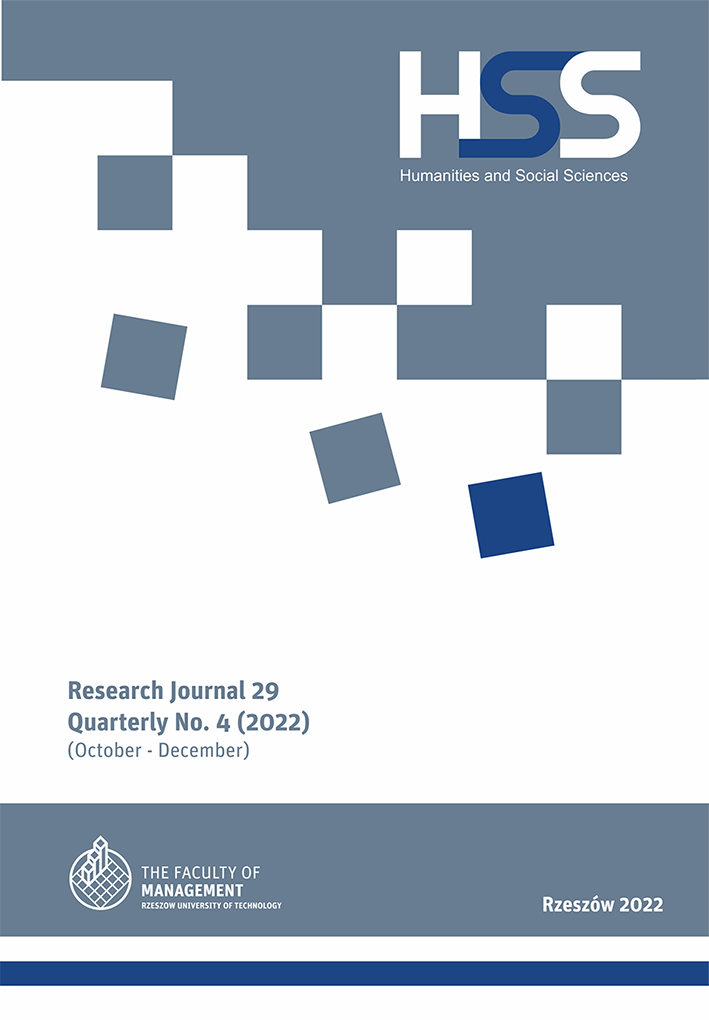Abstract
The Covid-19 pandemic has complicated business activities at various levels, primarily in terms of work organization. The objective of this research is to determine the significance of organizational culture for employees working in home office conditions. What values and amenities, previously preferred in a company, are missing for employees in remote working conditions at home (RQ1)? Which values of organizational culture were predominant during remote work, playing an important role in home office conditions (RQ2)? Which were lacking (RQ3)? To analyze the above issues, this article used both secondary studies of national reports examining remote work, and the author’s pilot study using an online questionnaire. The research results indicated that remote work during the Covid-19 pandemic, in most cases, did not neglect the key values of organizational culture and the involvement of employees. The biggest problem turned out to be cultivating the values primarily responsible for building trust, honesty, and respect, as well as communication and motivation.
References
Alvesson, M. (2012). Organizational culture: Meaning, discourse, and identity [In:] Ashkanasy, N.M., Wilderom, C.P.M., Peterson, M.F. (eds.), The Handbook of Organizational Culture and Climate, 2nd ed., Thousand Oaks, CA: Sage Publications, Inc.
Badanie Randstad (2021). Monitor rynku pracy [Access: 5.05.2022]. Access on the internet:
Belias, D., Koustelios, A. (2014). Organizational culture and job satisfaction: A review. “International Review of Management and Marketing”, No. 4(2).
Bisbey, T.M, Kilcullen, M.P, Thomas, E.J, Ottosen, M.J, Tsao, K, Salas, E. (2021). Safety Culture: An Integration of Existing Models and a Framework for Understanding Its Development. “Human Factors”, No. 63(1). DOI: 10.1177/0018720819868878.
ClickMeeting (2021). Jak oceniamy pracę zdalną po roku pandemii? [Access: 21.05.2022]. Access on the internet: https://knowledge.clickmeeting.com/uploads/2021/04/praca_zdalna_kwiecien_2021.pdf?_ga=2.40877735.445470426.1637858862-957357424.1637858862.
Dolot, A. (2020). Wpływ pandemii COVID-19 na pracę zdalną – perspektywa pracownika. „E-mentor” nr 1(83) [Access: 07.05.2022]. Access on the internet: https://www.e-mentor.edu.pl/artykul/index/numer/83/id/1456.
Hays Polska (2021). Pracownicy pozytywnie oceniają swoje relacje z przełożonymi od szefów oczekują empatii, szacunku i konsekwencji w działaniu [Access: 19.05.2022]. Access on the internet: https://focusonbusiness.eu/pl/wiadomosci/pracownicy-pozytywnie-oceniajaswoje-relacje-z-przelozonymi-od-szefow-oczekuja-empatii-szacunku-i-konsekwencji-wdzialaniu-1/20287.
https://centrumcyfrowe.pl/czytelnia/niematerialnosc-pracy-zdalnej/ [Access: 20.05.2022].
https://edition.cnn.com/2020/08/27/success/work-from-home-employer-plans-for-moreflexible-policies/index.html [Access: 05.05.2022].
https://www.egospodarka.pl/169905,Praca-hybrydowa-Bez-kultury-organizacyjnej-bedzieciezko,1,39,1.html [Access: 19.05.2022].
https://www.forbes.com/sites/carolinecastrillon/2021/12/27/t his-is-the-future-of-remote-workin-2021/?sh=254a00681e1d [Access: 15.05.2022].
https://www.prawo.pl/kadry/kultura-organizacyjna-w-czasach-pracy-zdalnej-po-czympoznac,510586.html [Access: 04.05.2022].
https://www.reuters.com/article/us-health-coronavirus-technology/permanently-remoteworkers-seen-doubling-in-2021-due-to-pandemic-productivity-survey-idUSKBN2772P0 [Access: 15.05.2022].
Hofstede, G., Hofstede, G.J., Minkov, M. (2011). Kultury i organizacje. Warszawa: PWE.
Howard-Grenville, J. (2020), How to sustain your organization’s culture when everyone is remote’. “MIT Sloan Management Review”, Vol. 62, iss. 1, June.
Kodeks pracy, art. 675 par. 1 (The Labor Code, Art. 675 paragraph 1).
Koźmiński, A.K., Jemielniak, D. (2008). Zarządzanie wiedzą. Warszawa: Wydawnictwa Akademickie i Profesjonalne.
Kniffin, K.M., Narayanan, J., Anseel, F., Antonakis, J., Ashford, S.P., Bakker, A.B., Bamberger, P., Bapuji, H., Bhave, D.P., Choi, V.K., Creary, S.J., Demerouti, E., Flynn, F.J., Gelfand, M. J., Greer, L.L., Johns, G., Kesebir, S., Klein, P.G., Lee, S.Y., Vugt, M.V. (2021). COVID-19 and the workplace: Implications, issues, and insights for future research and action. “American Psychologist” No. 76(1). DOI: 10.1037/amp0000716.
Kwantes, C.T. (2015). Organizational Culture. Wiley Encyclopedia of Management. DOI: 10.1002/9781118785317.weom060152.
Olearczyk, A, Walewska-Zielecka, B. (2021). Wpływ pandemii COVID-19 na wybrane obszary zdrowia, stylu życia i samopoczucia pracowników w Polsce [In:] Wioletta, N., Szalonki, K., eds., Zdrowie i styl życia. Ekonomiczne, społeczne i zdrowotne skutki pandemii, Wrocław: Wyd. Uniwersytet Wrocławski. DOI: 10.34616/142070.
Paprocki, R. (2020). Postawy względem pandemii COVID-19 Kultura jako sterownik zachowań w warunkach ryzyka i niepewności, „Pomiary. Automatyka. Robotyka”, R. 24, nr 4/2020. DOI: 10.14313/PAR_238/41.
Pettigrew, A.M. (1979). On studying organizational cultures. “Administrative Science Quarterly” nr 24.
Raport „Aspekty pracy zdalnej z perspektywy pracownika, pracodawcy i gospodarki, stan na 15 grudnia 2021” [Access: 11.05.2022]. Access on the internet: https://popw.parp.gov.pl/storage/publications/pdf/Praca_zdalna_last.pdf.
Raport Antal (2021). Spotkania i wydarzenia biznesowe w czasach zmiany [Access: 6.05.2022]. Access on the internet: https://antal.pl/wiedza/raport/spotkania-i-wydarzenia-biznesowew-czasach-zmiany.
Sapta, I.K.S., Muafi, M., Setini, Ni M. (2021). The Role of Technology, Organizational Culture, and Job Satisfaction in Improving Employee Performance during the Covid-19 Pandemic. „Journal of Asian Finance, Economics and Business”, Vol. 8, No 1. DOI: 10.13106/ jafeb.2021.
Schein, E. (2004). Organizational Culture and Leadership. 3rd edn. San Francisco: CA, Jossey-Bass.
Szluz, B. (2013). Telepraca – nowoczesna, elastyczna forma zatrudnienia i organizacji pracy – szansa czy zagrożenie? „Modern Management Review”, Vol. XVIII, 20 (4/2013). DOI: 10.7862/rz.2013.mmr.59.
Sęczkowska, K. (2019). Konsekwencje psychospołeczne pracy zdalnej. „Problemy Nauk Humanistycznych i Społecznych. Teoria i Praktyka”, nr 2.
Weber, K., Dacin, M.T. (2011). The cultural construction of organizational life: Introduction to the special issue. “Organization Science”, No. 22(2).
Wróbel, P., Jendza, D. (2018). Kontrowersje wokół definicji telepracy. “Zarządzanie i Finanse Journal of Management and Finance”, Vol. 16, No. 1/2/2018. https://about.gitlab.com/company/culture/all-remote/building-culture/ [Access: 18.05.2022].


